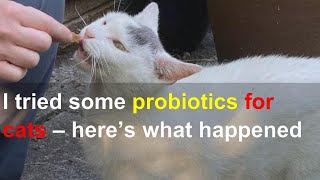I tried some probiotics for cats – here’s what happened
I tried some probiotics for cats – here’s what happened
 Wondering if probiotics for cats will do your moggy the world of good? It’s time to check them out…
Wondering if probiotics for cats will do your moggy the world of good? It’s time to check them out…
Music in Video: https://www.youtube.com/watch?v=c3M2tG2_OhI&list=PL5590sgkkE2oc5WsfK0drJTw4UIyMp2iw
Pets Radar
2022-08-23T14:26:47Z
There’s certainly no shortage of choice. Over the years, the desire for these supplements has grown so strong, the pet probiotic market now chock-a-block with companies claiming their products are the best. But what are probiotics and why are they useful?
As well as answering such questions, we also put three probiotics for cats to the test, looking to see how receptive our moggies were to each one of them. Did they make a difference to health or were they just cast aside giving them no chance to have an effect? You’re about to find out.
Probiotics act in much the same way for cats as they do for humans. Since they contain live bacteria (of the good kind) as well as yeasts, they help to restore a natural balance in a cat’s gut and this supports their digestive health.
Don’t worry if your cat continues to suffer from diarrhea a few days after they begin to take probiotics, though. It takes a little time for the good bacteria to work their magic so this is perfectly normal. Simply persevere. At the same time, assess a cat’s diet if diarrhea is becoming an ongoing problem.
If you have human probiotics knocking around your home, you may be tempted to save the hassle of purchasing cat probiotics by offering them to your moggy. But don’t do this! Although our digestive systems are not too dissimilar to cats, the simple fact there’s no research into what human probiotics does to your feline companion should be enough to err on the side of caution.
But what if you’ve already given cats a human probiotic? Don’t worry. It’s unlikely they will have been harmed but it’s best to stop doing so right away. If nothing else, you may also be introducing undesirable ingredients to your cat. Human probiotics also contain a higher dosage given the size of our bodies.
Alternatively, you could introduce probiotics are part of a cat’s daily health routine which is a good way of heading off potential problems before they begin.
In terms of exactly how much you should give, it’s always advisable to read the label on the probiotics you buy and follow the recommendations. After all, different probiotics come in different sizes and giving general advice is counterproductive.
There is absolutely no danger in giving probiotics daily, however, but if you feel your cat is getting a balanced diet and is healthy, you could give them less frequently. Talk to a vet for more advice.
Our feline reviewer, Nova, wasn’t too sure about these chews at first. He sniffed at them, stuck out his tongue and licked the tiniest of corners then walked away, finding something else to occupy him – a far cry from his reaction whenever the fridge door opens and he believes he may get some chicken!
We left it in his bowl, however, and later that day it had gone. He was then more receptive to further chews, one of which is designed to be given every day, particularly during times of stress or if your cat is suffering from gastrointestinal distress. With tradesmen in the house, Nova did appear a little stressed and he seemed to have a bout of diarrhea. The probiotics helped with this.
As a bonus, these probiotics are as natural as possible. They taste of duck but they don’t contain wheat, corn or artificial ingredients. They also have live cultures and prebiotic fiber (prebiotics feed friendly bacteria in the digestive system). So long as you can encourage your cat to eat them (and some other users report difficulties), you’ll be making a good choice here.
When we were transitioning our cat to new food a while ago, we used Purina’s Fortiflora to reduce the effects of stress. The idea is that you sprinkle the individual sachets of probiotic powder on to their food and it couldn’t be easier – a good way to hide what you’ve done, especially if you give it a nice stir. Our cat had no trouble eating it.
According to the manufacturer this supplement works as well for kittens as cats and it contains meat and animal derivatives, minerals and nutritional additives such as taurine. It also has gut flora stabilizers, of course. This includes the lactic acid bacteria Enterococcus faecium SF68 which supports microflora balance and intestinal health.
As with other users, we found it to be highly effective. A bout of diarrhea is cleared up quickly and many cat owners say it’s great for felines living with diabetes. You don’t have to sprinkle the whole sachet, of course. You could go for half if you wish. But it’s worth trying in any volume and it’s highly recommended.
Unlike the Purina product, here you get a tub of probiotic powder so you need to use th
